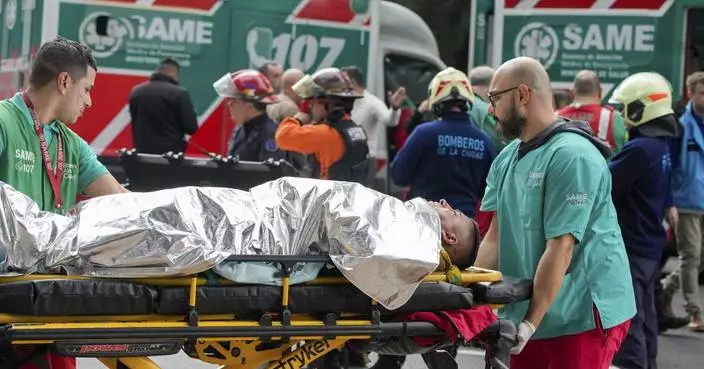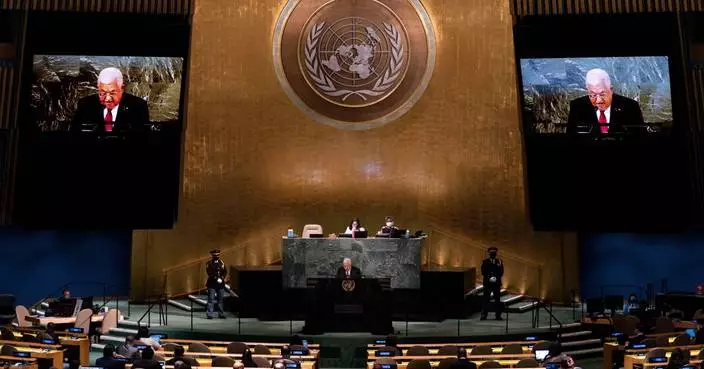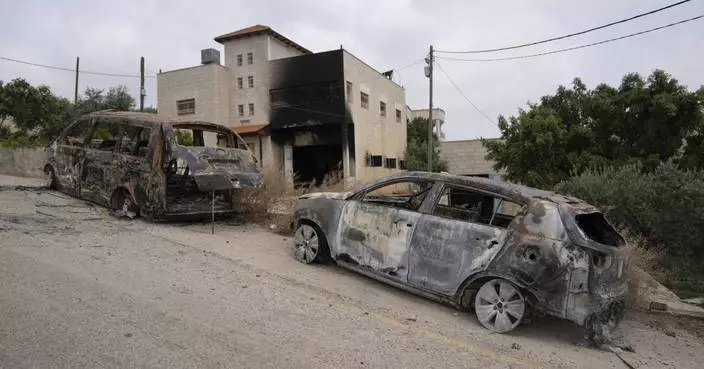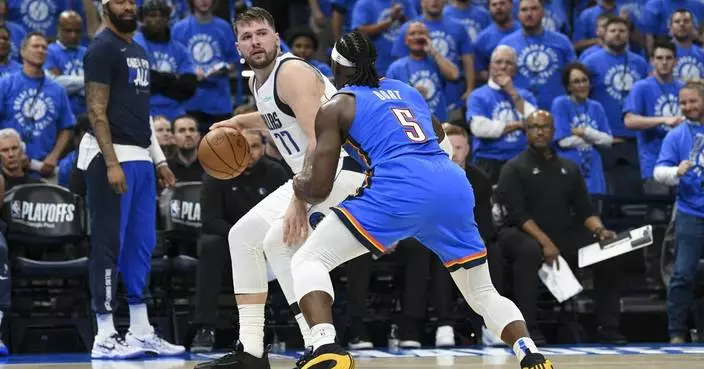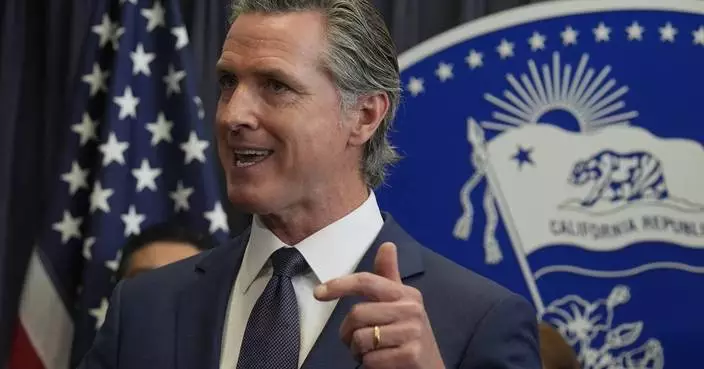The Chicago police officers clearly do not want to be in court testifying against a colleague accused of murder, with one of them so uncomfortable he couldn't bring himself to point to the man on trial, something witnesses are routinely asked to do.
But one after another — whether they want to or not — officers at the scene the night of Oct. 20, 2014, when white officer Jason Van Dyke emptied his gun into black teenager Laquan McDonald are being called to testify, as prosecutors seek to chip away at the "blue wall of silence" long associated with the city's police force and other law enforcement agencies across the country.
Testimony was expected to resume Wednesday.

Chicago Police Officer Joseph McElligott raises his right hand as he prepares to take the stand and testify during the opening statements in the first-degree murder trial of Chicago Police Officer Jason Van Dyke for the shooting death of Laquan McDonald at the Leighton Criminal Court Building, Monday, Sept. 17, 2018 in Chicago. (Antonio Perez Chicago Tribune via AP, Pool)
None of the officers has criticized Van Dyke in testimony over the first two days of his trial, but each has bolstered the contention by prosecutors that what Van Dyke did was "completely unnecessary." Van Dyke's attorneys say he feared for his life and acted according to his training.
Those testifying in Van Dyke's murder trial have included his partner that night, Joseph Walsh, one of three officers indicted on charges that they conspired to cover up what happened to protect Van Dyke. While video released more than a year after the shooting shows McDonald veering away from officers, Van Dyke and others on the scene initially said the 17-year-old had lunged at them with a knife.
Walsh, who is no longer on the force, acknowledged Tuesday that he "could have" fired, before answering, "Yes," to the question of whether he chose not to. But he also defended his partner's actions, saying he was "confident officer Van Dyke took necessary action to save himself and myself." And he maintained that he saw McDonald raise his right arm to swing it "in our direction," even though video of the shooting that played as he spoke doesn't show that. He maintained that he had a different vantage point.

Chicago Police Officer Dora Fontaine testifies during the trial for the shooting death of Laquan McDonald, in the first-degree murder trial of Chicago Police Officer Jason Van Dyke at the Leighton Criminal Court Building, Monday, Sept. 17, 2018, in Chicago. (Antonio Perez Chicago Tribune via AP, Pool)
Another witness, officer Joseph McElligott, was so reluctant to testify that prosecutors finally gave up trying to get him to point to Van Dyke after he was asked the routine question of whether he knew the defendant.
According to some experts, Walsh's testimony — and that of other officers — represents a shift in the landscape for a police force that the U.S. Justice Department in January 2017 described as having a "pervasive cover-up culture."
"The fact that you have officers forced to testify is a huge moment," said Matt Topic, an attorney who waged an ultimately successful legal battle to force the city to release the video of the McDonald shooting in 2015.
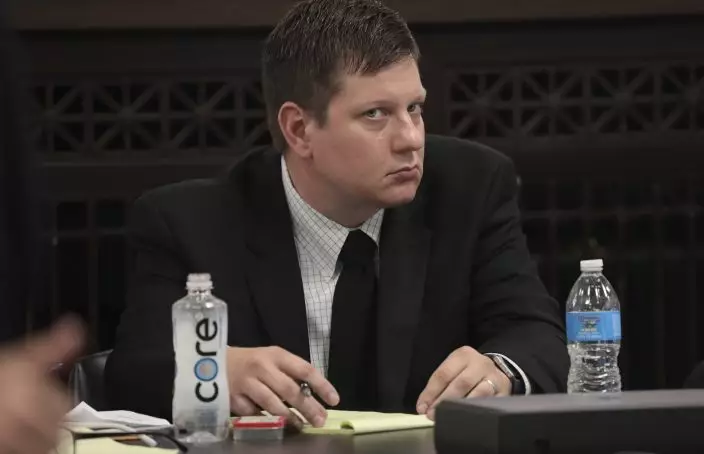
Chicago Police Officer Jason Van Dyke listens during his trial for the shooting death of Laquan McDonald at the Leighton Criminal Court Building, Monday, Sept. 17, 2018 in Chicago. McDonald died during a confrontation with Van Dyke on Oct. 20, 2014, in Chicago. (Antonio Perez Chicago Tribune via AP, Pool)
Van Dyke is the first Chicago police officer in decades to be charged with murder for an on-duty shooting. He's pleaded not guilty to first-degree murder, aggravated battery and official misconduct.
To Phil Turner, a former federal prosecutor who is now a defense attorney in Chicago, the blue wall of silence isn't weakening so much as video evidence is revealing the truth. He points out that some officers are testifying only because they would otherwise be held in contempt of court. He sees police using video as key — not because it will make officers reluctant to lie to cover for their fellow officers but because it renders those lies "irrelevant."
"If they refuse to talk, who cares, they've got the video," he said.
Topic agrees that video has been important in Van Dyke's case.
"All of those officers had to know there was dashcam video and still they felt safe enough to provide a narrative that wasn't true," he said.
Dora Fontaine is the only officer to challenge statements attributed to her in police reports about the shooting. She arrived as Van Dyke was firing 16 bullets into McDonald. Fontaine testified Monday that she saw the knife in McDonald's right hand, but she did not see him raise his arm or charge at the officers.
Officer McElligott, who also testified Monday, was responding to reports that someone was breaking into vehicles in a trucking yard when he encountered McDonald.
McElligott said that even after McDonald stabbed the tire of his squad car, he didn't think it was necessary to fire his weapon. Instead, he and his partner were waiting for an officer to show up with a Taser to use on McDonald.
"We were just trying to be patient," he told the jury.
Sign up for the AP's weekly newsletter showcasing our best reporting from the Midwest and Texas: http://apne.ws/2u1RMfv
WASHINGTON (AP) — A soon-to-be-released Biden administration review of Israel's use of U.S.-provided weapons in its war in Gaza does not conclude that Israel has violated the terms for their use, according to three people who have been briefed on the matter.
The report is expected to be sharply critical of Israel, even though it doesn't conclude that Israel violated terms of U.S.-Israel weapons agreements, according to one U.S. official.
The administration's findings on its close ally's conduct of the war, a first-of-its-kind assessment that was compelled by President Joe Biden's fellow Democrats in Congress, comes after seven months of airstrikes, ground fighting and aid restrictions that have claimed the lives of nearly 35,000 Palestinians, mostly women and children.
Biden has tried to walk an ever-finer line in his support of Prime Minister Benjamin Netanyahu’s war against Hamas. He has faced growing rancor at home and abroad over the soaring Palestinian death toll and the onset of famine, caused in large part by Israeli restrictions on the movement of food and aid into Gaza. Tensions have been heightened further in recent weeks by Netanyahu’s pledge to expand the Israeli military’s offensive in the crowded southern city of Rafah, despite Biden's adamant opposition.
Biden is in the closing months of a tough reelection campaign against Donald Trump. He faces demands from many Democrats that he cut the flow of offensive weapons to Israel and denunciation from Republicans who accuse him of wavering on support for Israel at its time of need.
Two U.S. officials and a third person briefed on the findings of the national security memorandum to be submitted by Secretary of State Antony Blinken to Congress discussed the findings before the report's release. They spoke on condition of anonymity because the information was not yet public.
A senior Biden administration official said the memorandum is expected to be released later Friday, but declined to comment on its conclusions.
Axios first reported on the memorandum's findings.
The Democratic administration took one of the first steps toward conditioning military aid to Israel in recent days when it paused a shipment of 3,500 bombs out of concern over Israel’s threatened offensive on Rafah, a southern city crowded with more than a million Palestinians, a senior administration official said.
The presidential directive, agreed to in February, obligated the Defense and State departments to conduct “an assessment of any credible reports or allegations that such defense articles and, as appropriate, defense services, have been used in a manner not consistent with international law, including international humanitarian law.”
The agreement also obligated them to tell Congress whether they deemed that Israel has acted to “arbitrarily to deny, restrict, or otherwise impede, directly or indirectly,” delivery of any U.S.-supported humanitarian aid into Gaza for starving civilians there.
Lawmakers and others who advocated for the review said Biden and previous American leaders have followed a double standard when enforcing U.S. laws governing how foreign militaries use U.S. support, an accusation the Biden administration denies. They had urged the administration to make a straightforward legal determination of whether there was credible evidence that specific Israeli airstrikes on schools, crowded neighborhoods, medical workers, aid convoys and other targets, and restrictions on aid shipments into Gaza, violated the laws of war and human rights.
Their opponents argued that a U.S. finding against Israel would weaken it at a time it is battling Hamas and other Iran-backed groups. Any sharply critical findings on Israel are sure to add to pressure on Biden to curb the flow of weapons and money to Israel’s military and further heighten tensions with Netanyahu’s hard-right government over its conduct of the war against Hamas.
Any finding against Israel also could endanger Biden’s support in this year's presidential elections from some voters who keenly support Israel.
At the time the White House agreed to the review, it was working to head off moves from Democratic lawmakers and independent Sen. Bernie Sanders of Vermont to start restricting shipments of weapons to Israel.
Israel launched its offensive after an Oct. 7 assault into Israel, led by Hamas, killed about 1,200 people. Two-thirds of the Palestinians killed since then have been women and children, according to local health officials. U.S. and U.N. officials say Israeli restrictions on food shipments since Oct. 7 have brought on full-fledged famine in northern Gaza.
Human rights groups long have accused Israeli security forces of committing abuses against Palestinians and have accused Israeli leaders of failing to hold those responsible to account. In January, in a case brought by South Africa, the top U.N. court ordered Israel to do all it could to prevent death, destruction and any acts of genocide in Gaza, but the panel stopped short of ordering an end to the military offensive.
Israel says it is following all U.S. and international law, that it investigates allegations of abuse by its security forces and that its campaign in Gaza is proportional to the existential threat it says is posed by Hamas.
Biden in December said “indiscriminate bombing” was costing Israel international backing. After Israeli forces targeted and killed seven aid workers from the World Central Kitchen in April, the Biden administration for the first time signaled it might cut military aid to Israel if it didn’t change its handling of the war and humanitarian aid.
Presidents Ronald Reagan and George H.W. Bush, in the 1980s and early 1990s, were the last presidents to openly hold back weapons or military financing to try to push Israel to change its actions in the region or toward Palestinians.
A report to the Biden administration by an unofficial, self-formed panel including military experts, academics and former State Department officials detailed Israeli strikes on aid convoys, journalists, hospitals, schools and refugee centers and other sites. They argued that the civilian death toll in those strikes — such as an Oct. 31 strike on an apartment building reported to have killed 106 civilians — was disproportionate to the blow against any military target.
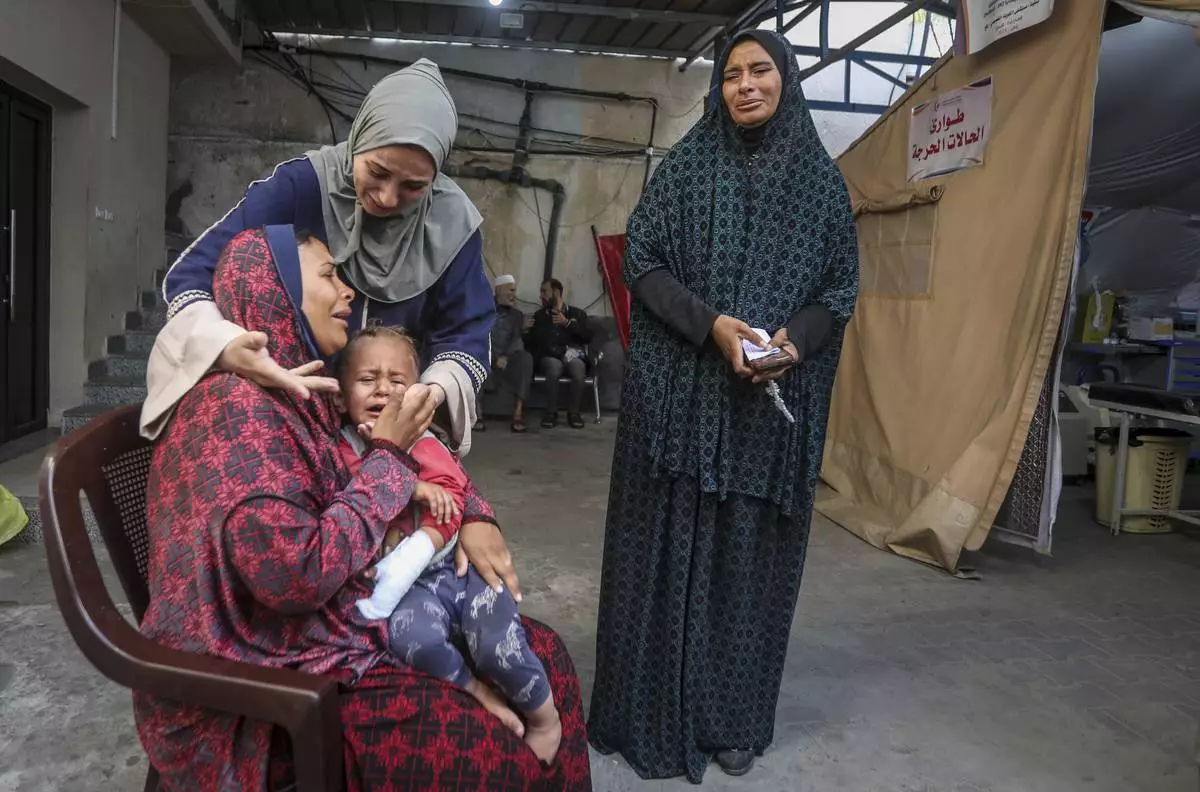
Palestinians mourn their relatives killed in the Israeli bombardment of the Gaza Strip, at a hospital in Rafah, Gaza, Friday, May 10, 2024. (AP Photo/Ismael Abu Dayyah)
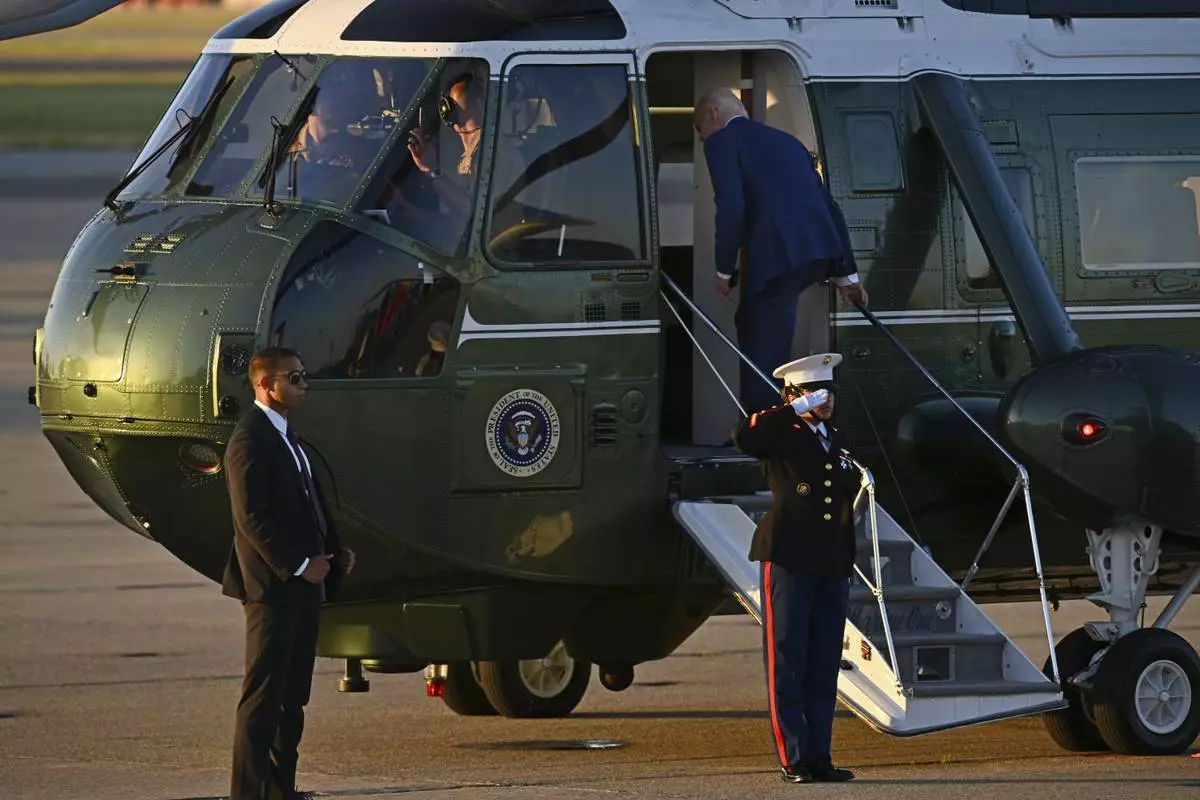
U.S. President Joe Biden boards Marine One at Moffett Airfield in Mountain View, Calif., Thursday, May 9, 2024. (Jose Carlos Fajardo/Pool Photo via AP)








